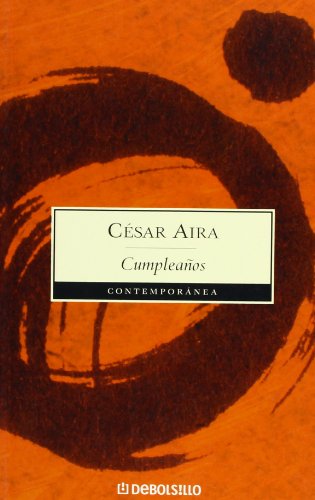What do you think?
Rate this book


112 pages, Hardcover
First published January 1, 2001


life is change and movement. i stay still, doing the same thing every day, while everyone else is rushing around at a phenomenal speed.reading césar aira remains a singular joy, as with each new book (there are over 90!), his readers never quite know what to expect. the 16th of the argentine's works to be translated into english, birthday (cumpleaños) was published shortly after the author turned 50 (the english edition is released around the time of aira's 70th birthday). a ruminative, philosophical, and melancholy blend of personal reflection and self-criticism, birthday is one of aira's most endearing works (though likely to be enjoyed most by those already familiar with his prodigious, impressive output).
in a way, you don't have to be a believer to believe in the life to come, because the two lives are superimposed and blended in the present. "he who waits despairs," as the proverb says. i would say: "he who waits deludes himself" because what you're waiting for has already begun and sometimes it's already over. that's the nature of the present.sticking to his "flight forward" style of composition, birthday ponders heady notions of life, death, aging, craft, meaning, purpose, knowledge, uniqueness, regret, stasis and change, and action ("the daughter of negativity"). it can be hard to delineate where fact and fiction converge in aira's writing, yet, as with nearly every one of his other books, birthday seamlessly blends the quotidian with the off-beat. armed amply with abundant humor, aira considers his own life and literary body with an equal dose of modesty and self-deprecation. birthday brims with thoughtfulness, contemplation, and resignation, revealing the personal side of one of latin america's most intriguing, prolific authors. a must-read for every aira fan.
there's a hole in me, and in that little white darkness, i discover the real heart of the mystery, which is also my rosetta stone. if i could translate what i don't know into what i know, i would be able to understand the purpose of my life. as things are, it all seems an illusion, a simulacrum made of words. and even if i understood, the scandal of my ignorance would remain intact. i lean over this bottomless well, narcissus reborn, and an unfamiliar sadness overcomes me. i think this is the first time i have felt like a part of humanity, just when i finally have a reason to feel different.
A mi edad, no puedo ver sino con espanto las eternidades de tiempo perdido en mi juventud. La falta de método, los desvíos caprichosos, las esperas de nada. Las horas desperdiciadas, los días, los años, las décadas.
Ahora bien, las cosas no siempre salen como uno se lo propone; si no, todo sería obras maestras, o los artistas serían siempre jóvenes. Para demostrarlo, bastaría comparar las dos imágenes de mi cifra personal: el que me gustaría ser, y el que soy.
Si tuviera que hacer un resumen final, diría que el problema fue éste: toda mi vida busqué el conocimiento, pero lo busqué fuera del tiempo, y el tiempo se tomó venganza sucediendo en otra parte. Es por eso que la experiencia no me enseñó nada (el asunto de la Luna), y el conocimiento quedó en un plano alucinatorio. Y ahora descubro que ese plano también me expulsa; se pliega, desaparece… En una buena novela la ilusión se logra mediante la acumulación de rasgos circunstanciales, y para hacer ese trabajo hay que creer. El día antes hay que creer, el día después hay que haber creído.